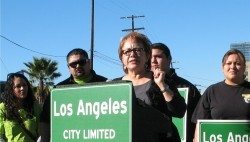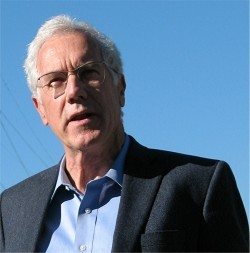Labor & Economy
7.6 Billion Reasons to Raise L.A.’s Minimum Wage

There was a time when we listened to science, leaned forward when its experts spoke about smoking, clean air and water, or the need for something called a seatbelt. But that was long ago, before corporate interests convinced us that the best policy for just about any social crisis was to do nothing. Today research surveys that statistically demonstrate the benefits of raising the minimum wage have about the same chance of being heard above the denial din as climate change papers.
Nevertheless, the authors of Effects of a Fifteen Dollar an Hour Minimum Wage in the City of Los Angeles, a new study conducted by the Economic Roundtable and funded by the Los Angeles County Federation of Labor, hope to open some very closed minds about these economic benefits. Tuesday the two groups released the study at a media event held on a corner of Lafayette Park.
Labor and community groups are using the study to campaign for raising Los Angeles’ minimum wage to $15 an hour. County Fed staff director Glen Arnodo told Capital & Main that this campaign is a complement to the Raise LA effort to win a $15.37 an hour wage for workers in L.A.’s large hotels, although it is not a part of that campaign.
Maria Elena Durazo, the Fed’s executive secretary-treasurer, noted that while Los Angeles is a city of diversity, the study’s results “show that diversity stops when it comes to the paychecks of working people.” She then cited some of the Roundtable’s findings.
“Forty-six percent live on poverty wages in one of the most expensive cities in the world,” said Durazo. “If every low wage worker in L.A. made $15 an hour it would raise enough city revenue to fill 10 million potholes. Or hire 1,000 first responders. Or keep every library open every day.”
These figures are startling because, on the surface, the city of Los Angeles looks prosperous – its residents’ estimated average hourly wage is $27.85. This yields, the study says, “$58,244 for the average wage and salary worker.” Yet the Roundtable’s data show what a mirage this prosperity is. Among the findings:
- Three-quarters of the fulltime labor force residing in the City of Los Angeles earn less than comparable workers 30 years ago.
- This wage erosion becomes worse the lower down the income percentile you go. (The 25th percentile – the working poor – has been hit hardest.)
- That 46 percent of Angelenos who earn less than $15 an hour translates into a population of working poor of 810,864.
- Raising the minimum wage to $15 an hour would create an estimated 64,700 new jobs in the county to meet the increased demand for goods and services.
The event’s centerpiece was the unveiling of a billboard, rendered in the style of a green city limits sign. There are seven of these now spread out around L.A., announcing:
Los Angeles
City Limited
Poverty Wage Pop 810,864
The Economic Roundtable study, which took four months to complete, makes a compelling case for a minimum wage raise, stating its thesis in non-polemical language while focusing on the benefits to be enjoyed by the raise. (Specifically, that raising the wage would put $7.6 billion of spending money into L.A’s economic bloodstream.) But will its figures and conclusions get lost among the blizzard of industry counter-research or political indifference? And, perhaps more important, have we become so inured to human hardship that a plea to pay just wages has to be made in terms of economic logic and not fair play for workers?
“I think the research makes an argument of moral fairness,” said Daniel Flaming, one of the study’s authors. “We want people to be able to live with a minimal standard of dignity if they’re doing something for our shared wellbeing – these are the people who put a roof on our house or a meal on our table. Our society isn’t sustainable if there are such vast disparities between people who share the tasks of making our economy work.”

-

 The SlickJanuary 27, 2026
The SlickJanuary 27, 2026The One Big Beautiful Prediction: The Energy Transition Is Still Alive
-

 Column - State of InequalityJanuary 29, 2026
Column - State of InequalityJanuary 29, 2026Are California’s Billionaires Crying Wolf?
-

 Latest NewsFebruary 3, 2026
Latest NewsFebruary 3, 2026Amid the Violent Minnesota Raids, ICE Arrests Over 100 Refugees, Ships Many to Texas
-

 Dirty MoneyJanuary 30, 2026
Dirty MoneyJanuary 30, 2026Amid Climate Crisis, Insurers’ Increased Use of AI Raises Concern For Policyholders
-

 Featured VideoFebruary 4, 2026
Featured VideoFebruary 4, 2026Protesters Turn to Economic Disruption to Fight ICE
-

 The SlickFebruary 2, 2026
The SlickFebruary 2, 2026Colorado May Ask Big Oil to Leave Millions of Dollars in the Ground
-

 Column - State of InequalityFebruary 5, 2026
Column - State of InequalityFebruary 5, 2026Lawsuits Push Back on Trump’s Attack on Child Care
-

 Column - California UncoveredFebruary 6, 2026
Column - California UncoveredFebruary 6, 2026What It’s Like On the Front Line as Health Care Cuts Start to Hit



